Gammera the Invincible Blu-ray Movie
HomeGammera the Invincible Blu-ray Movie 
Arrow | 1966 | 86 min | Not rated | No Release Date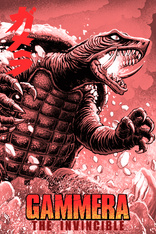
Price
Movie rating
5.6 | / 10 |
Blu-ray rating
| Users | 0.0 | |
| Reviewer | 3.0 | |
| Overall | 3.0 |
Overview
Gammera the Invincible (1966)
After the atomic bombs carried by a shot-down Soviet bomber explode in the Artic, the creature Gammera is released from his hibernation. The giant prehistoric turtle proceeds on a path to Tokyo and destroys anything in his path. The military and the scientific community rush to find a means to stop this monster before Tokyo is laid to waste.
Starring: Albert Dekker, Brian Donlevy, Diane Findlay (I), John Baragrey, Dick O'NeillDirector: Sandy Howard, Noriaki Yuasa
| Sci-Fi | Uncertain |
| Family | Uncertain |
Specifications
Video
Video codec: MPEG-4 AVC
Video resolution: 1080p
Aspect ratio: 2.35:1
Original aspect ratio: 2.35:1
Audio
English: DTS-HD Master Audio Mono (48kHz, 24-bit)
Subtitles
English SDH
Discs
Blu-ray Disc
Single disc (1 BD)
Playback
Region A (B, C untested)
Review
Rating summary
| Movie | 3.0 | |
| Video | 2.5 | |
| Audio | 3.5 | |
| Extras | 1.0 | |
| Overall | 3.0 |
Gammera the Invincible Blu-ray Movie Review
Reviewed by Jeffrey Kauffman October 25, 2020 Note: This film is available as part of Gamera: The Complete Collection. This is "officially" listed as a supplement on the disc containing
Gamera.
Theres a venerable old maxim that states whats sauce for the goose is sauce for gander, and in that regard, this deluxe Arrow release may
be
thought of as being at least kinda sorta the same sauce for an iconic kaiju that Criterions Godzilla: The Showa-Era Films, 1954-1975 was for
what is
arguably the most iconic kaiju in the annals of Japanese cinema. The Criterion release aggregated fifteen Godzilla films
ranging
from the monsters 1954 debut to Terror of Mechagodzilla
from
1975, while this collection covers the Gamera films from the 1965 debut of the creature through 2006's Gamera the Brave. The comparison between the two franchises is perhaps particularly apt in
that, as August Ragone gets into in some of the bounteous supplemental features included on
this release, Gamera was Daieis attempt to duplicate the success that Toho had had with the Godzilla films. As such, theres
an
undeniably derivative aspect to quite a few (maybe all) of the Gamera films, plus there is a perhaps equally undeniable
comedic
element in that Gamera is in essence a giant, marauding turtle, as opposed to the arguably more threatening dinosaur-like ambience of Godzilla.
Aside from the inclusion of retooled American versions of some of the films that this Arrow set offers as ostensible supplements, all of the original
versions of the twelve "Japanese" films in this set save one were included in
Gamera HD Bundle Collection from Mill Creek Entertainment several years ago, albeit with pretty shoddy technical merits according to
my colleague Martin Liebman's reviews (the parent entry for the collection does not have a separate review, but if you go to the product Overview tab, Marty has reviewed all but
one of
the films in the set linked to in the parent review). Mill Creek also released Gamera Trilogy, which Marty reviewed separately, and which includes his only review of Gamera 3: Revenge of
Iris. I'll refer to Marty's reviews in my reviews of the shared films in this set for those who want plot recaps, leaving the bulk of my
reviews to both technical assessments and detailing of the supplementary material. The one outlier that wasn't released by Mill Creek, the
aformentioned Gamera the Brave, was released by Tokyo Shock a few years ago and was reviewed at that time by Brian Orndorf, so in
my review of that particular film I'll be referring to Brian's review for plot information. As always it can also be
instructive to look at the various reviews in order to compare screenshots. I will say that I evidently have more of a soft spot for some of these
films than my colleagues, and my scores for the films reflect that opinion.
Arrow, long the champion of cult items, has outdone itself with this release, offering all of the Gamera films in a really handsomely
appointed
package that includes a glut of both on disc bonus features as well as accompanying non-disc swag (the disc related supplements are detailed in
the
individual reviews of each film, while the non-disc supplements are listed in the
Gamera: The Complete Collection Blu-ray review).
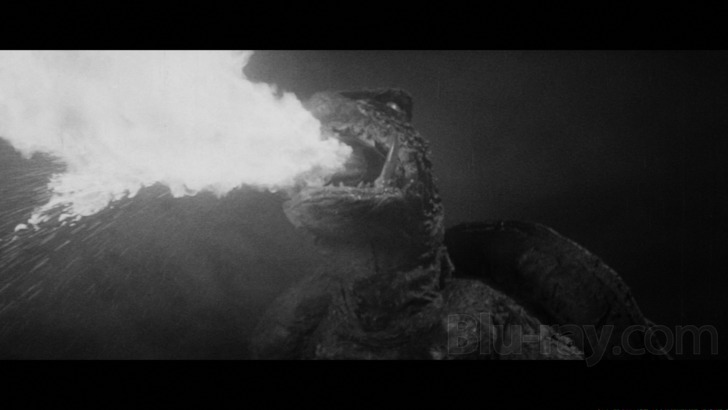
As August Ragone gets into in some the enjoyable (and frequently quite funny) supplements he contributes to this release, one of the undeniable low points of the original Japanese version of Gamera were the sequences featuring Americans, whom Ragone suggests may have simply been dragged off some Tokyo street or something like that and told they were going to be in a movie, considering their relative lack of performance expertise. When Gamera swam "over the pond" to appear in the United States as the slightly alternatively spelled Gammera, the Invincible, Sandy Howard shot new material with more experienced English speaking actors, and there is noticeable improvement in the performances in these scenes. The film is slightly rejiggered in other ways as well, but retains the same basic through line as the original.
Gammera the Invincible Blu-ray Movie, Video Quality 
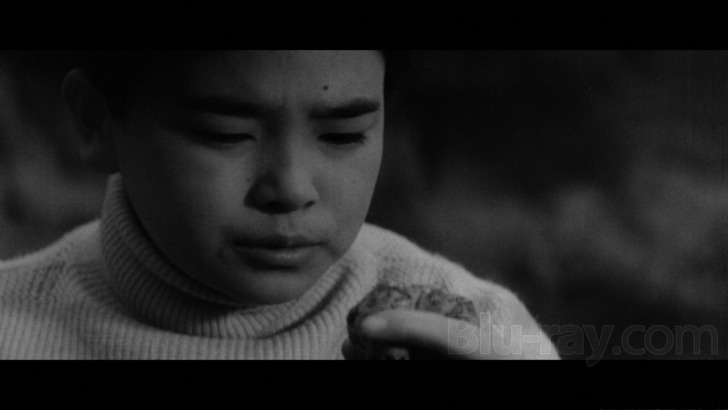
Gammera, the Invincible is presented on Blu-ray courtesy of Arrow Video with an AVC encoded 1080p transfer in 2.35:1. Arrow's oversized booklet containing information on the films lumps the entire series together in its descriptions of the transfers:
The masters for all twelve original Japanese films were prepared and supplied to Arrow Films by the Kadokawa Corporation. Gamera the Guardian of the Universe, Gamera 2: Attack of Legion, and Gamera 3: Revenge of Iris were restored in 4K by Kadokawa and approved by director Shusuke Kaneko in 2015.This transfer shows considerably more damage than the original Japanese version, with several pretty bad and recurrent vertical scratches, as well as other nicks, tears and signs of age. This has a somewhat dupier overall look, though that said, grain is generally less abundant looking than in the original Japanese version. As with the Japanese version, there are some brightness and flicker issues, and this presentation has a bit less consistent looking contrast on the whole, with some whites in particular coming close to looking blown out.
Original 16mm and 35mm materials relating to the English language versions originally distributed in the United States by American International and Filmways were accessed through the kind courtesy of Metro Goldwyn Mayer, in association with the Kadokawa Corporation. The English dubbed audio was restored from the original magnetic and optical tracks by Deluxe, who also conformed it to the Japanese masters. Some additional 16mm materials were sourced from UCLA Film Archive. The film elements, which include English language credit sequences, insert shots and trailers, were scanned at EFilm and restored at R3Store Studios. Additional English language materials for the series were kindly supplied by Shout! Factory, ADV Films and Media Blasters, with additional thanks to Paulie Senkawsky and Will Offutt.
For Gammera the Invincible, the American theatrical version of Gamera, the Giant Monster, attempts were made to access the original negative held at UCLA Film Archive, but this is no longer legally accessible. A 35mm exhibition print was scanned in high definition by Legend Films, who provided this HD master to Arrow. This print was missing some shots of a jet pilot at the start of the film, and another film source for these shots could not be found. To insure an uncut presentation, these missing shots were reintegrated into the master using the HD master for Gamera, the Giant Monster for the video and an analog tape master for the dubbed English audio. As a result, some of these shots have burnt in Japanese subtitles that did not feature on the original American theatrical release and could not be removed here; we hope these do not affect your enjoyment of the film. Additional restoration took place at R3Store Studios.
Gammera the Invincible Blu-ray Movie, Audio Quality 
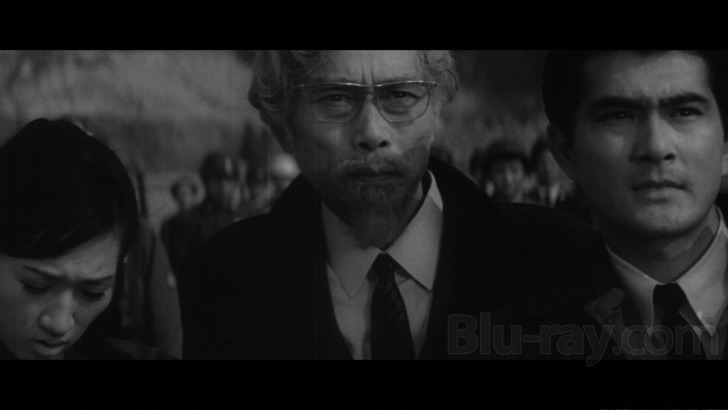
Gammera, the Invincible features a DTS-HD Master Audio Mono track in English which has a somewhat boxy sound but which offers capable support for dialogue, effects and the "new, improved" score which features a quasi-rock theme song. There's no damage of any import to speak of, but "sync is loose", as is often said about these dubbed efforts. Optional English subtitles are available.
Gammera the Invincible Blu-ray Movie, Special Features and Extras 
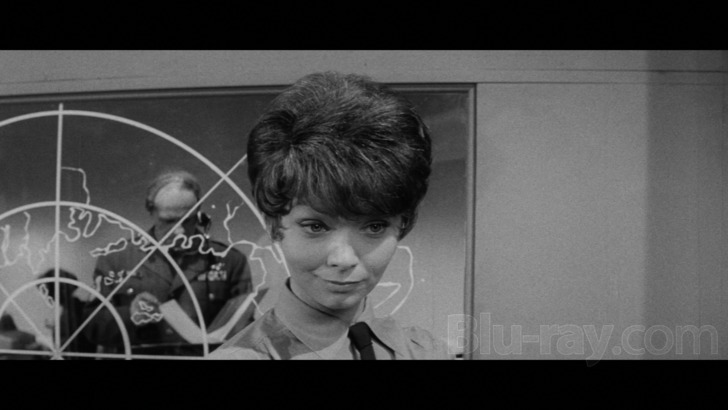
- US Theatrical Trailer (1080p; 1:35)
- Theme Song (1080p; 4:08) is an audio supplement that plays to some fun stills of the 45 and promotional material for the single.
Gammera the Invincible Blu-ray Movie, Overall Score and Recommendation 
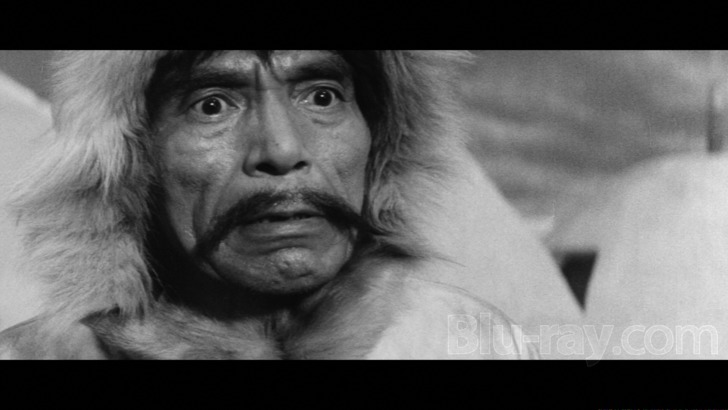
Many English speaking fans may have grown up with this version of Gamera as their introduction to the creature, and though offered here as an ostensible "supplement", its inclusion in the Gamera collection will no doubt be appreciated. Technical merits are a bit less consistent with regard to video in this version, but there's nothing overly problematic.
Other editions
Gammera the Invincible: Other Editions
Similar titles
Similar titles you might also like
(Still not reliable for this title)

Gamera the Brave
2006

Gamera
Daikaijū Gamera / Gamera, the Giant Monster
1965

Gamera vs. Jiger
Gamera tai Daimaju Jaiga
1970

Gamera vs. Guiron
Gamera tai daiakuju Giron
1969

Gamera vs. Gyaos
Daikaijū kūchūsen: Gamera tai Gyaosu
1967

Gamera vs. Barugon
Daikaijū kettō: Gamera tai Barugon
1966

Gamera vs. Viras
Gamera tai uchu kaijū Bairasu / Destroy All Planets
1968

Gamera: Super Monster
Uchu kaijū Gamera
1980

Gamera vs. Zigra
Gamera tai Shinkai kaijū Jigura
1971

Gamera: Guardian of the Universe
Gamera daikaijū kuchu kessen
1995

Gamera 3: Revenge of Iris
1999

Godzilla, King of the Monsters!
1956

King Kong vs. Godzilla
キングコング対ゴジラ / Kingu Kongu tai Gojira / 1962 Japanese version
1962

Godzilla Raids Again
ゴジラの逆襲 / Gojira no gyakushū
1955

Terror of Mechagodzilla
メカゴジラの逆襲 / Mekagojira no gyakushu
1975

Godzilla vs. the Smog Monster
ゴジラ対ヘドラ / Gojira tai Hedora / Godzilla vs. Hedorah
1971

Godzilla vs. Megalon
ゴジラ対メガロ / Gojira tai Megaro
1973

Destroy All Monsters
怪獣総進撃 / Kaijū sōshingeki
1968

Godzilla vs. Mechagodzilla
ゴジラ対メカゴジラ / Gojira tai Mekagojira
1974

Invasion of Astro-Monster zero
1965

